A Study on Bhutanese Teachers' Attitudes Towards Inclusive Education
VerifiedAdded on 2022/10/01
|17
|4028
|258
Report
AI Summary
This report presents a comprehensive study on the attitudes of Bhutanese teachers toward inclusive education. The research focuses on understanding teachers' perceptions of integrating students with special educational needs into regular classrooms. It begins with an abstract and introduction, outlining the research area, question, and significance. A thorough literature review explores the importance of teacher attitudes and factors influencing them, including teacher-related and educational environment-related variables. The methodology section details the mixed-method approach, conceptual framework, and constructivism paradigm adopted. Data collection procedures involve surveys, and the analysis utilizes both qualitative and quantitative techniques. The report also includes data presentation, results, discussion, and conclusions, along with a complete list of references. The study aims to provide valuable insights into the challenges and opportunities of inclusive education within the Bhutanese context.
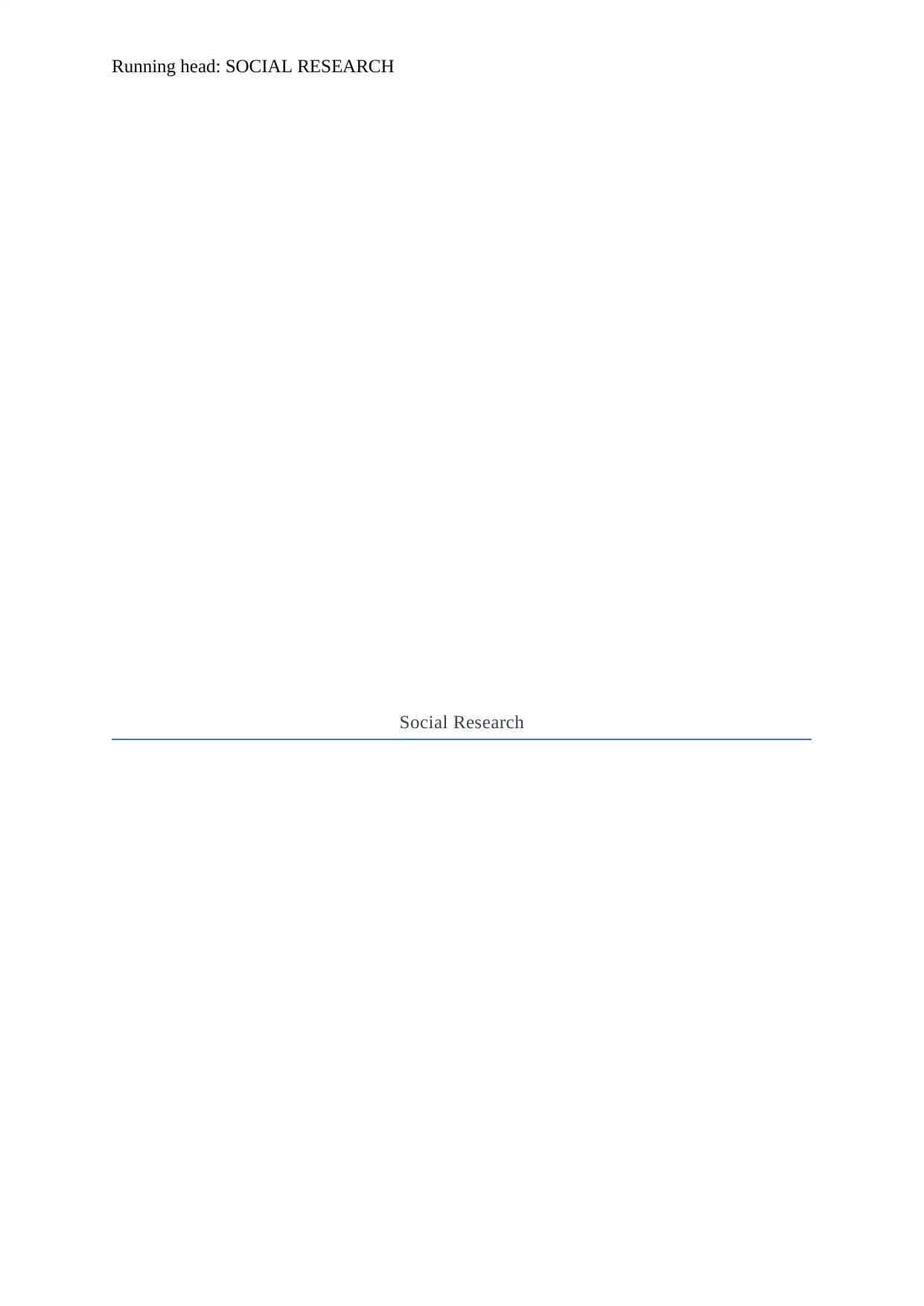
Running head: SOCIAL RESEARCH
Social Research
Social Research
Paraphrase This Document
Need a fresh take? Get an instant paraphrase of this document with our AI Paraphraser
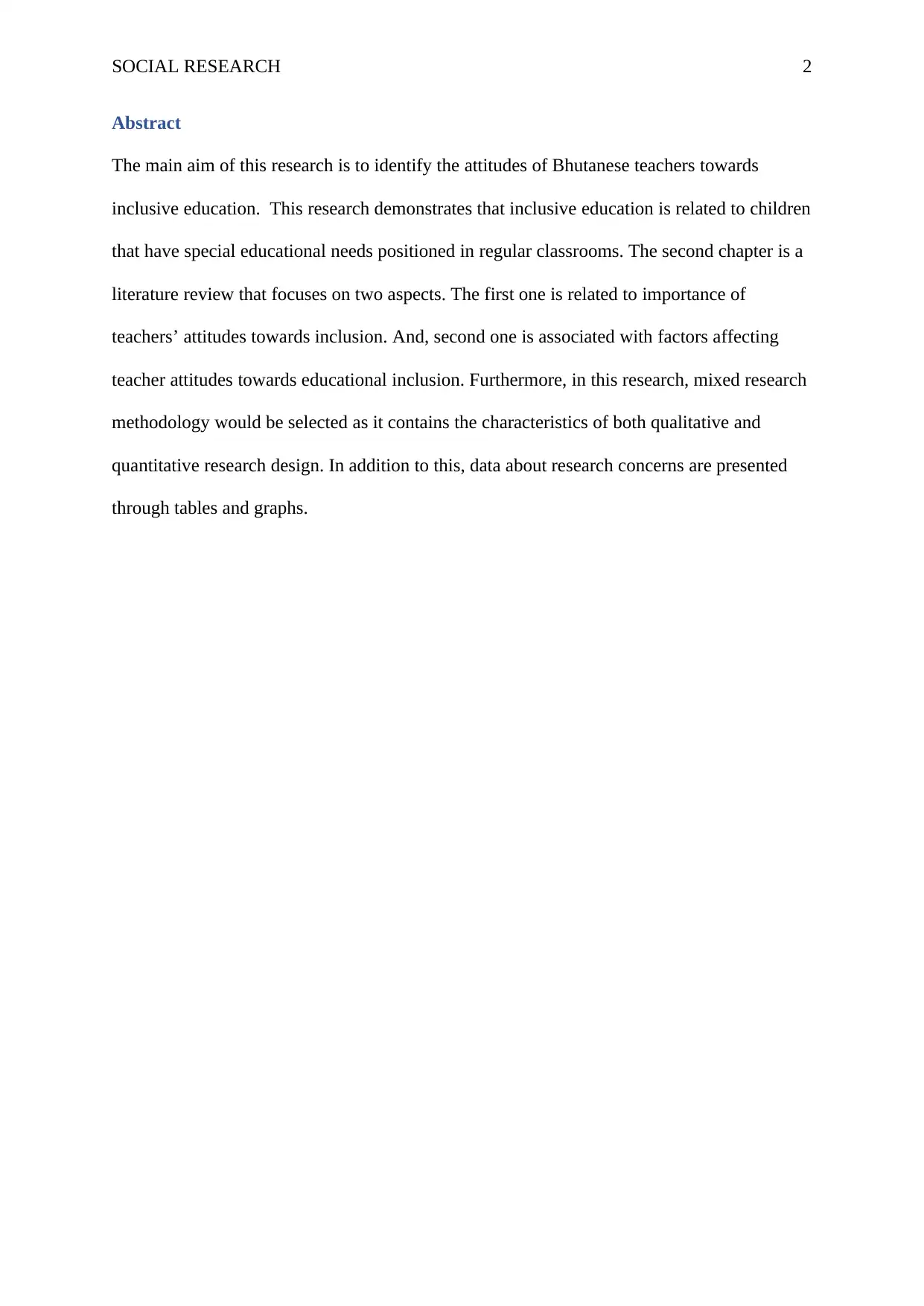
SOCIAL RESEARCH 2
Abstract
The main aim of this research is to identify the attitudes of Bhutanese teachers towards
inclusive education. This research demonstrates that inclusive education is related to children
that have special educational needs positioned in regular classrooms. The second chapter is a
literature review that focuses on two aspects. The first one is related to importance of
teachers’ attitudes towards inclusion. And, second one is associated with factors affecting
teacher attitudes towards educational inclusion. Furthermore, in this research, mixed research
methodology would be selected as it contains the characteristics of both qualitative and
quantitative research design. In addition to this, data about research concerns are presented
through tables and graphs.
Abstract
The main aim of this research is to identify the attitudes of Bhutanese teachers towards
inclusive education. This research demonstrates that inclusive education is related to children
that have special educational needs positioned in regular classrooms. The second chapter is a
literature review that focuses on two aspects. The first one is related to importance of
teachers’ attitudes towards inclusion. And, second one is associated with factors affecting
teacher attitudes towards educational inclusion. Furthermore, in this research, mixed research
methodology would be selected as it contains the characteristics of both qualitative and
quantitative research design. In addition to this, data about research concerns are presented
through tables and graphs.
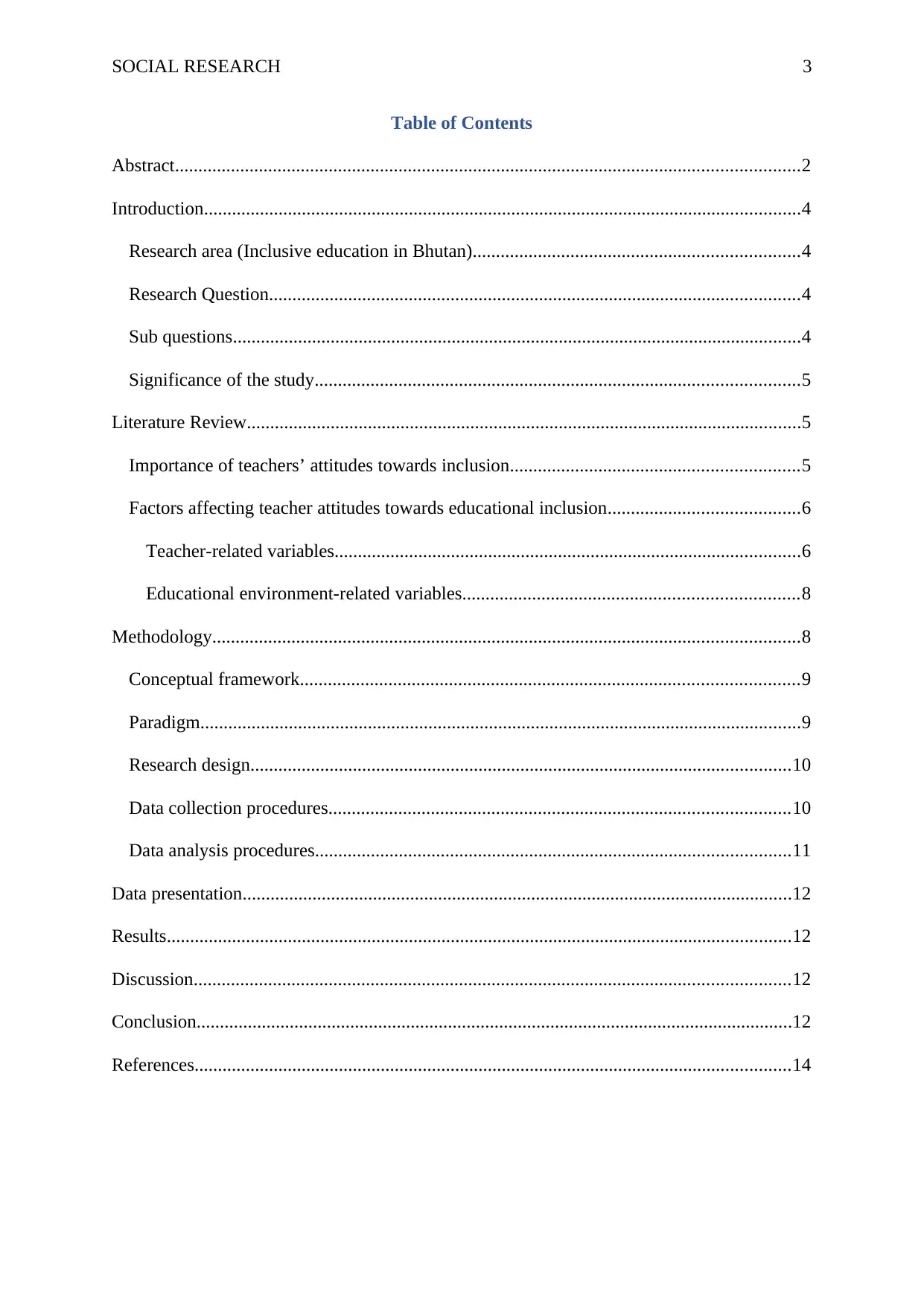
SOCIAL RESEARCH 3
Table of Contents
Abstract......................................................................................................................................2
Introduction................................................................................................................................4
Research area (Inclusive education in Bhutan)......................................................................4
Research Question..................................................................................................................4
Sub questions..........................................................................................................................4
Significance of the study........................................................................................................5
Literature Review.......................................................................................................................5
Importance of teachers’ attitudes towards inclusion..............................................................5
Factors affecting teacher attitudes towards educational inclusion.........................................6
Teacher-related variables....................................................................................................6
Educational environment-related variables........................................................................8
Methodology..............................................................................................................................8
Conceptual framework...........................................................................................................9
Paradigm.................................................................................................................................9
Research design....................................................................................................................10
Data collection procedures...................................................................................................10
Data analysis procedures......................................................................................................11
Data presentation......................................................................................................................12
Results......................................................................................................................................12
Discussion................................................................................................................................12
Conclusion................................................................................................................................12
References................................................................................................................................14
Table of Contents
Abstract......................................................................................................................................2
Introduction................................................................................................................................4
Research area (Inclusive education in Bhutan)......................................................................4
Research Question..................................................................................................................4
Sub questions..........................................................................................................................4
Significance of the study........................................................................................................5
Literature Review.......................................................................................................................5
Importance of teachers’ attitudes towards inclusion..............................................................5
Factors affecting teacher attitudes towards educational inclusion.........................................6
Teacher-related variables....................................................................................................6
Educational environment-related variables........................................................................8
Methodology..............................................................................................................................8
Conceptual framework...........................................................................................................9
Paradigm.................................................................................................................................9
Research design....................................................................................................................10
Data collection procedures...................................................................................................10
Data analysis procedures......................................................................................................11
Data presentation......................................................................................................................12
Results......................................................................................................................................12
Discussion................................................................................................................................12
Conclusion................................................................................................................................12
References................................................................................................................................14
⊘ This is a preview!⊘
Do you want full access?
Subscribe today to unlock all pages.

Trusted by 1+ million students worldwide
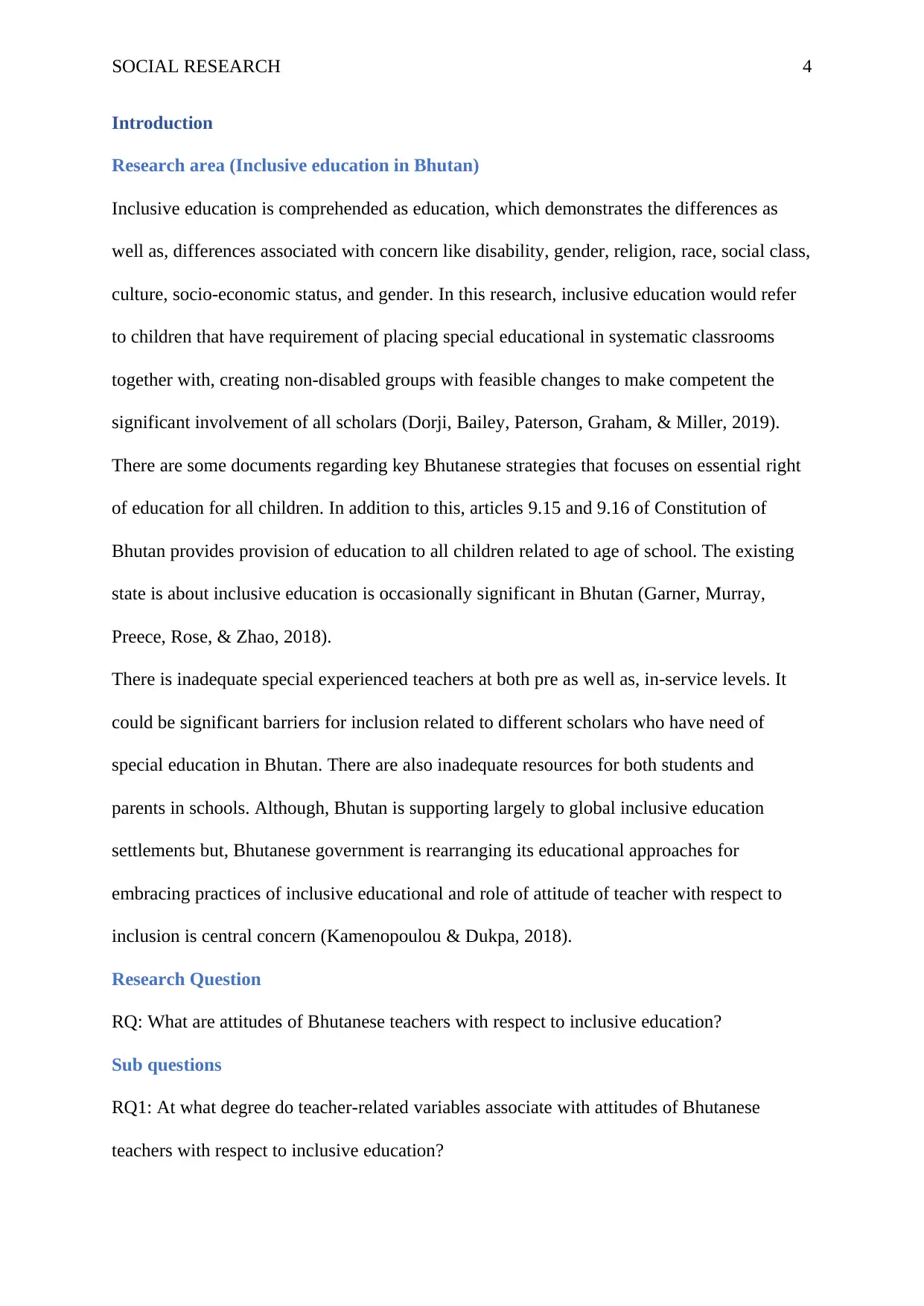
SOCIAL RESEARCH 4
Introduction
Research area (Inclusive education in Bhutan)
Inclusive education is comprehended as education, which demonstrates the differences as
well as, differences associated with concern like disability, gender, religion, race, social class,
culture, socio-economic status, and gender. In this research, inclusive education would refer
to children that have requirement of placing special educational in systematic classrooms
together with, creating non-disabled groups with feasible changes to make competent the
significant involvement of all scholars (Dorji, Bailey, Paterson, Graham, & Miller, 2019).
There are some documents regarding key Bhutanese strategies that focuses on essential right
of education for all children. In addition to this, articles 9.15 and 9.16 of Constitution of
Bhutan provides provision of education to all children related to age of school. The existing
state is about inclusive education is occasionally significant in Bhutan (Garner, Murray,
Preece, Rose, & Zhao, 2018).
There is inadequate special experienced teachers at both pre as well as, in-service levels. It
could be significant barriers for inclusion related to different scholars who have need of
special education in Bhutan. There are also inadequate resources for both students and
parents in schools. Although, Bhutan is supporting largely to global inclusive education
settlements but, Bhutanese government is rearranging its educational approaches for
embracing practices of inclusive educational and role of attitude of teacher with respect to
inclusion is central concern (Kamenopoulou & Dukpa, 2018).
Research Question
RQ: What are attitudes of Bhutanese teachers with respect to inclusive education?
Sub questions
RQ1: At what degree do teacher-related variables associate with attitudes of Bhutanese
teachers with respect to inclusive education?
Introduction
Research area (Inclusive education in Bhutan)
Inclusive education is comprehended as education, which demonstrates the differences as
well as, differences associated with concern like disability, gender, religion, race, social class,
culture, socio-economic status, and gender. In this research, inclusive education would refer
to children that have requirement of placing special educational in systematic classrooms
together with, creating non-disabled groups with feasible changes to make competent the
significant involvement of all scholars (Dorji, Bailey, Paterson, Graham, & Miller, 2019).
There are some documents regarding key Bhutanese strategies that focuses on essential right
of education for all children. In addition to this, articles 9.15 and 9.16 of Constitution of
Bhutan provides provision of education to all children related to age of school. The existing
state is about inclusive education is occasionally significant in Bhutan (Garner, Murray,
Preece, Rose, & Zhao, 2018).
There is inadequate special experienced teachers at both pre as well as, in-service levels. It
could be significant barriers for inclusion related to different scholars who have need of
special education in Bhutan. There are also inadequate resources for both students and
parents in schools. Although, Bhutan is supporting largely to global inclusive education
settlements but, Bhutanese government is rearranging its educational approaches for
embracing practices of inclusive educational and role of attitude of teacher with respect to
inclusion is central concern (Kamenopoulou & Dukpa, 2018).
Research Question
RQ: What are attitudes of Bhutanese teachers with respect to inclusive education?
Sub questions
RQ1: At what degree do teacher-related variables associate with attitudes of Bhutanese
teachers with respect to inclusive education?
Paraphrase This Document
Need a fresh take? Get an instant paraphrase of this document with our AI Paraphraser
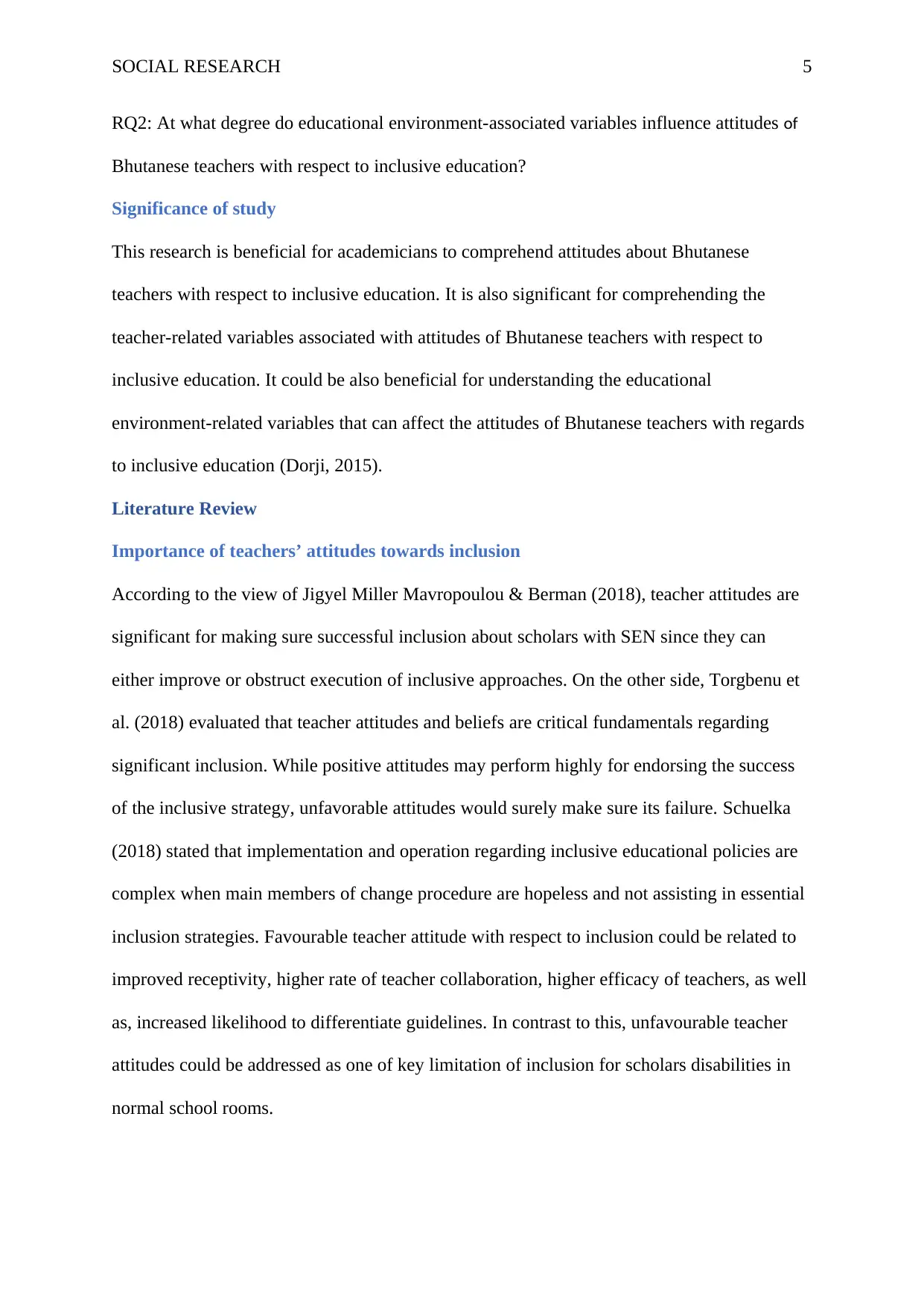
SOCIAL RESEARCH 5
RQ2: At what degree do educational environment-associated variables influence attitudes of
Bhutanese teachers with respect to inclusive education?
Significance of study
This research is beneficial for academicians to comprehend attitudes about Bhutanese
teachers with respect to inclusive education. It is also significant for comprehending the
teacher-related variables associated with attitudes of Bhutanese teachers with respect to
inclusive education. It could be also beneficial for understanding the educational
environment-related variables that can affect the attitudes of Bhutanese teachers with regards
to inclusive education (Dorji, 2015).
Literature Review
Importance of teachers’ attitudes towards inclusion
According to the view of Jigyel Miller Mavropoulou & Berman (2018), teacher attitudes are
significant for making sure successful inclusion about scholars with SEN since they can
either improve or obstruct execution of inclusive approaches. On the other side, Torgbenu et
al. (2018) evaluated that teacher attitudes and beliefs are critical fundamentals regarding
significant inclusion. While positive attitudes may perform highly for endorsing the success
of the inclusive strategy, unfavorable attitudes would surely make sure its failure. Schuelka
(2018) stated that implementation and operation regarding inclusive educational policies are
complex when main members of change procedure are hopeless and not assisting in essential
inclusion strategies. Favourable teacher attitude with respect to inclusion could be related to
improved receptivity, higher rate of teacher collaboration, higher efficacy of teachers, as well
as, increased likelihood to differentiate guidelines. In contrast to this, unfavourable teacher
attitudes could be addressed as one of key limitation of inclusion for scholars disabilities in
normal school rooms.
RQ2: At what degree do educational environment-associated variables influence attitudes of
Bhutanese teachers with respect to inclusive education?
Significance of study
This research is beneficial for academicians to comprehend attitudes about Bhutanese
teachers with respect to inclusive education. It is also significant for comprehending the
teacher-related variables associated with attitudes of Bhutanese teachers with respect to
inclusive education. It could be also beneficial for understanding the educational
environment-related variables that can affect the attitudes of Bhutanese teachers with regards
to inclusive education (Dorji, 2015).
Literature Review
Importance of teachers’ attitudes towards inclusion
According to the view of Jigyel Miller Mavropoulou & Berman (2018), teacher attitudes are
significant for making sure successful inclusion about scholars with SEN since they can
either improve or obstruct execution of inclusive approaches. On the other side, Torgbenu et
al. (2018) evaluated that teacher attitudes and beliefs are critical fundamentals regarding
significant inclusion. While positive attitudes may perform highly for endorsing the success
of the inclusive strategy, unfavorable attitudes would surely make sure its failure. Schuelka
(2018) stated that implementation and operation regarding inclusive educational policies are
complex when main members of change procedure are hopeless and not assisting in essential
inclusion strategies. Favourable teacher attitude with respect to inclusion could be related to
improved receptivity, higher rate of teacher collaboration, higher efficacy of teachers, as well
as, increased likelihood to differentiate guidelines. In contrast to this, unfavourable teacher
attitudes could be addressed as one of key limitation of inclusion for scholars disabilities in
normal school rooms.
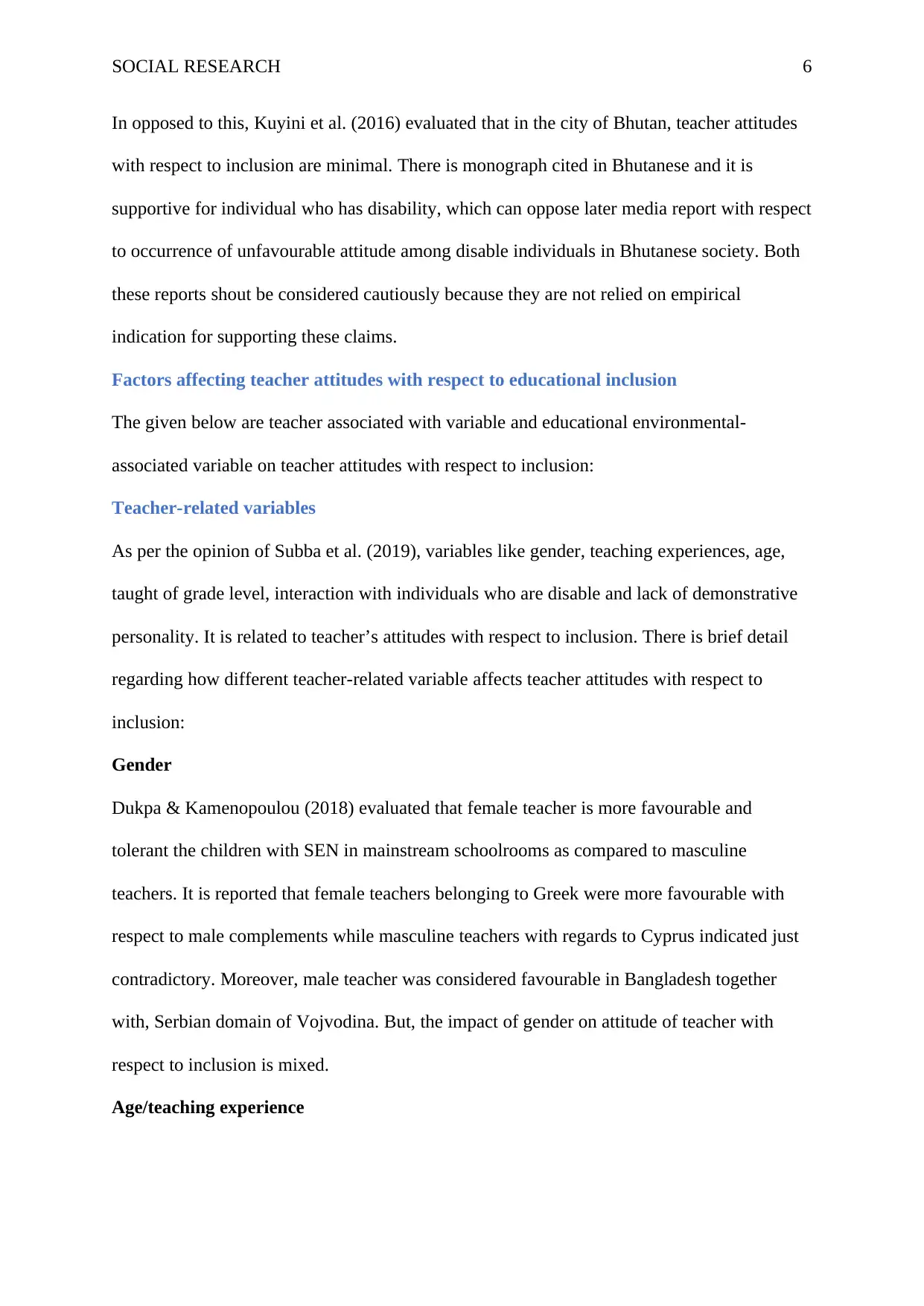
SOCIAL RESEARCH 6
In opposed to this, Kuyini et al. (2016) evaluated that in the city of Bhutan, teacher attitudes
with respect to inclusion are minimal. There is monograph cited in Bhutanese and it is
supportive for individual who has disability, which can oppose later media report with respect
to occurrence of unfavourable attitude among disable individuals in Bhutanese society. Both
these reports shout be considered cautiously because they are not relied on empirical
indication for supporting these claims.
Factors affecting teacher attitudes with respect to educational inclusion
The given below are teacher associated with variable and educational environmental-
associated variable on teacher attitudes with respect to inclusion:
Teacher-related variables
As per the opinion of Subba et al. (2019), variables like gender, teaching experiences, age,
taught of grade level, interaction with individuals who are disable and lack of demonstrative
personality. It is related to teacher’s attitudes with respect to inclusion. There is brief detail
regarding how different teacher-related variable affects teacher attitudes with respect to
inclusion:
Gender
Dukpa & Kamenopoulou (2018) evaluated that female teacher is more favourable and
tolerant the children with SEN in mainstream schoolrooms as compared to masculine
teachers. It is reported that female teachers belonging to Greek were more favourable with
respect to male complements while masculine teachers with regards to Cyprus indicated just
contradictory. Moreover, male teacher was considered favourable in Bangladesh together
with, Serbian domain of Vojvodina. But, the impact of gender on attitude of teacher with
respect to inclusion is mixed.
Age/teaching experience
In opposed to this, Kuyini et al. (2016) evaluated that in the city of Bhutan, teacher attitudes
with respect to inclusion are minimal. There is monograph cited in Bhutanese and it is
supportive for individual who has disability, which can oppose later media report with respect
to occurrence of unfavourable attitude among disable individuals in Bhutanese society. Both
these reports shout be considered cautiously because they are not relied on empirical
indication for supporting these claims.
Factors affecting teacher attitudes with respect to educational inclusion
The given below are teacher associated with variable and educational environmental-
associated variable on teacher attitudes with respect to inclusion:
Teacher-related variables
As per the opinion of Subba et al. (2019), variables like gender, teaching experiences, age,
taught of grade level, interaction with individuals who are disable and lack of demonstrative
personality. It is related to teacher’s attitudes with respect to inclusion. There is brief detail
regarding how different teacher-related variable affects teacher attitudes with respect to
inclusion:
Gender
Dukpa & Kamenopoulou (2018) evaluated that female teacher is more favourable and
tolerant the children with SEN in mainstream schoolrooms as compared to masculine
teachers. It is reported that female teachers belonging to Greek were more favourable with
respect to male complements while masculine teachers with regards to Cyprus indicated just
contradictory. Moreover, male teacher was considered favourable in Bangladesh together
with, Serbian domain of Vojvodina. But, the impact of gender on attitude of teacher with
respect to inclusion is mixed.
Age/teaching experience
⊘ This is a preview!⊘
Do you want full access?
Subscribe today to unlock all pages.

Trusted by 1+ million students worldwide
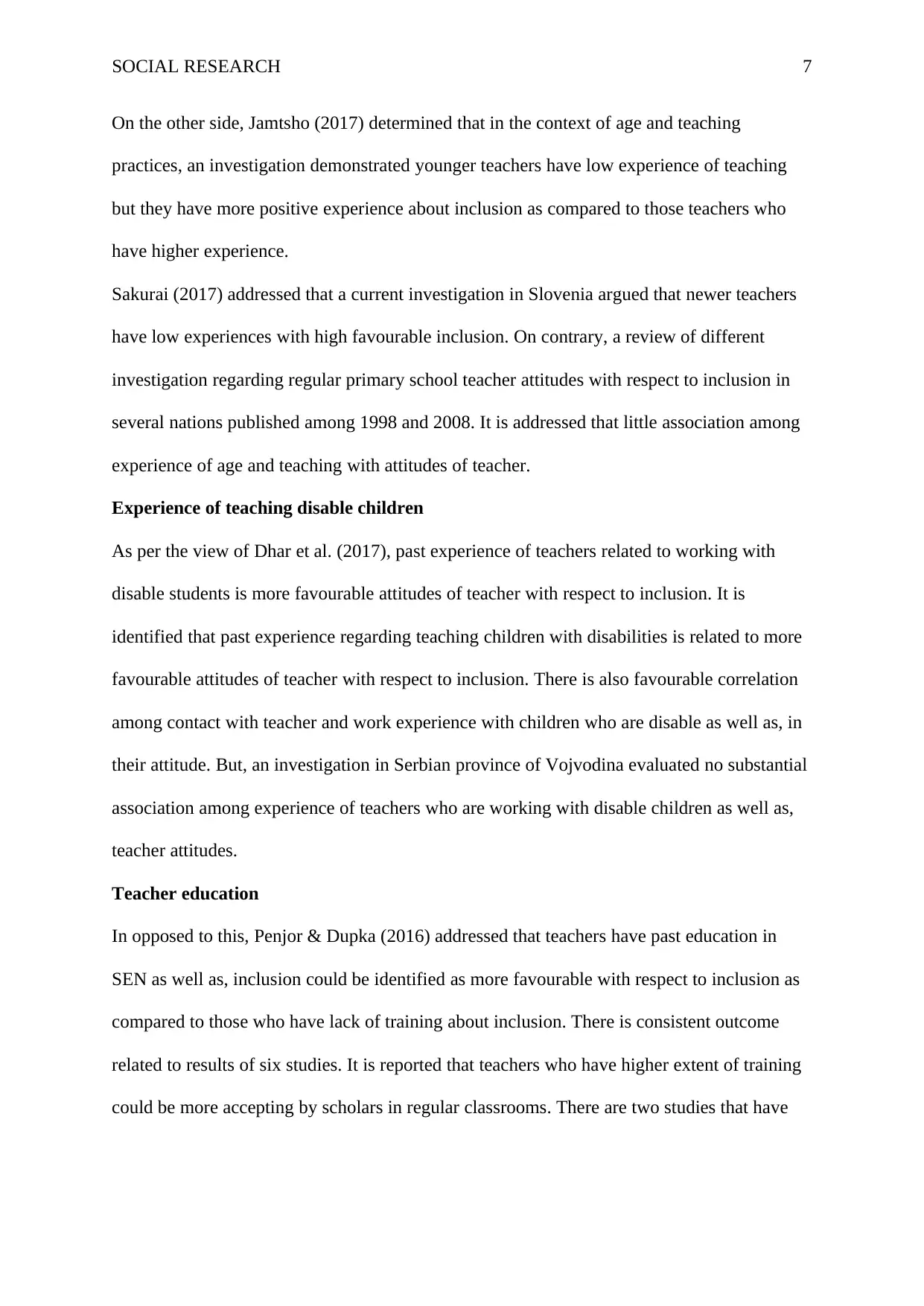
SOCIAL RESEARCH 7
On the other side, Jamtsho (2017) determined that in the context of age and teaching
practices, an investigation demonstrated younger teachers have low experience of teaching
but they have more positive experience about inclusion as compared to those teachers who
have higher experience.
Sakurai (2017) addressed that a current investigation in Slovenia argued that newer teachers
have low experiences with high favourable inclusion. On contrary, a review of different
investigation regarding regular primary school teacher attitudes with respect to inclusion in
several nations published among 1998 and 2008. It is addressed that little association among
experience of age and teaching with attitudes of teacher.
Experience of teaching disable children
As per the view of Dhar et al. (2017), past experience of teachers related to working with
disable students is more favourable attitudes of teacher with respect to inclusion. It is
identified that past experience regarding teaching children with disabilities is related to more
favourable attitudes of teacher with respect to inclusion. There is also favourable correlation
among contact with teacher and work experience with children who are disable as well as, in
their attitude. But, an investigation in Serbian province of Vojvodina evaluated no substantial
association among experience of teachers who are working with disable children as well as,
teacher attitudes.
Teacher education
In opposed to this, Penjor & Dupka (2016) addressed that teachers have past education in
SEN as well as, inclusion could be identified as more favourable with respect to inclusion as
compared to those who have lack of training about inclusion. There is consistent outcome
related to results of six studies. It is reported that teachers who have higher extent of training
could be more accepting by scholars in regular classrooms. There are two studies that have
On the other side, Jamtsho (2017) determined that in the context of age and teaching
practices, an investigation demonstrated younger teachers have low experience of teaching
but they have more positive experience about inclusion as compared to those teachers who
have higher experience.
Sakurai (2017) addressed that a current investigation in Slovenia argued that newer teachers
have low experiences with high favourable inclusion. On contrary, a review of different
investigation regarding regular primary school teacher attitudes with respect to inclusion in
several nations published among 1998 and 2008. It is addressed that little association among
experience of age and teaching with attitudes of teacher.
Experience of teaching disable children
As per the view of Dhar et al. (2017), past experience of teachers related to working with
disable students is more favourable attitudes of teacher with respect to inclusion. It is
identified that past experience regarding teaching children with disabilities is related to more
favourable attitudes of teacher with respect to inclusion. There is also favourable correlation
among contact with teacher and work experience with children who are disable as well as, in
their attitude. But, an investigation in Serbian province of Vojvodina evaluated no substantial
association among experience of teachers who are working with disable children as well as,
teacher attitudes.
Teacher education
In opposed to this, Penjor & Dupka (2016) addressed that teachers have past education in
SEN as well as, inclusion could be identified as more favourable with respect to inclusion as
compared to those who have lack of training about inclusion. There is consistent outcome
related to results of six studies. It is reported that teachers who have higher extent of training
could be more accepting by scholars in regular classrooms. There are two studies that have
Paraphrase This Document
Need a fresh take? Get an instant paraphrase of this document with our AI Paraphraser
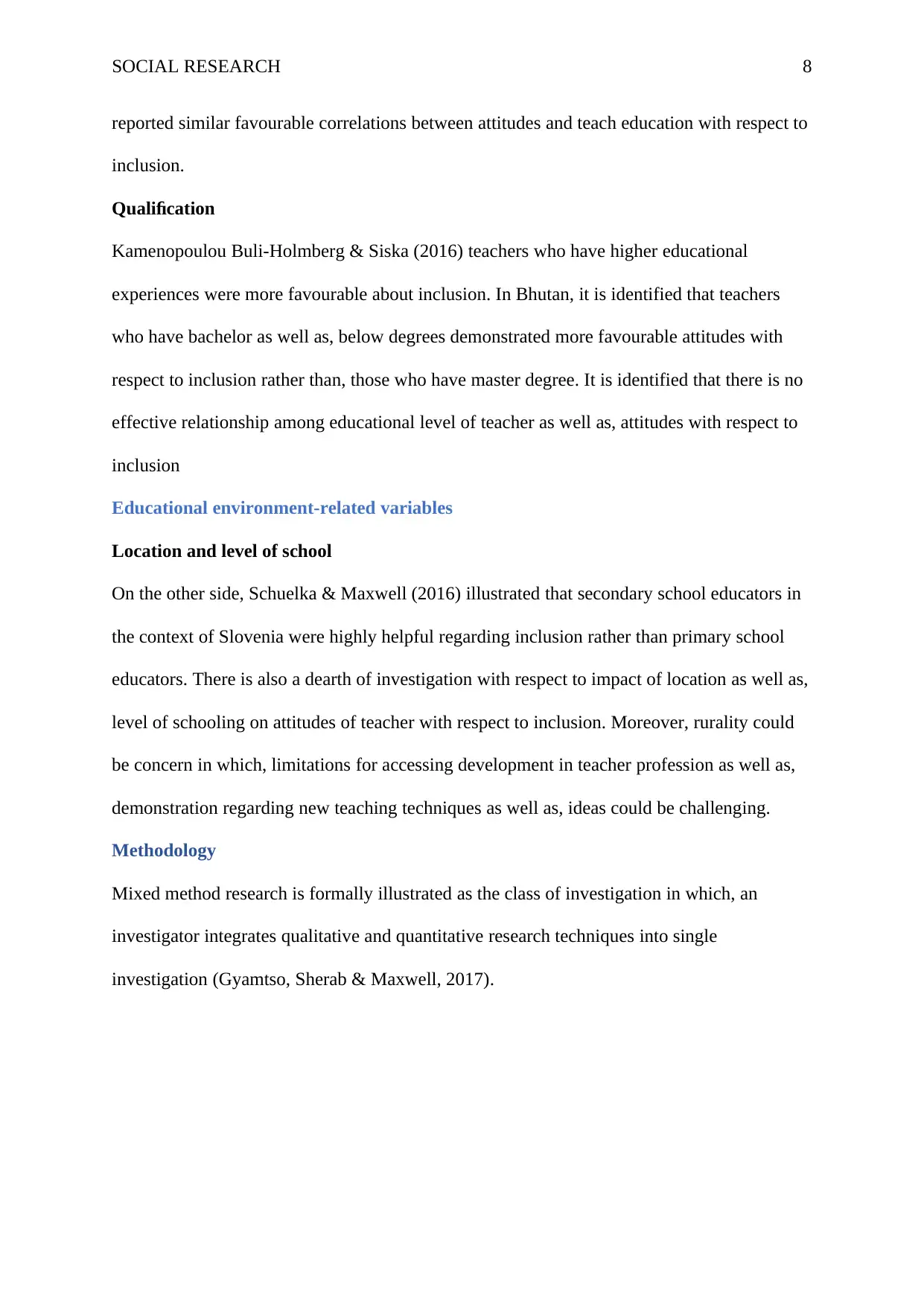
SOCIAL RESEARCH 8
reported similar favourable correlations between attitudes and teach education with respect to
inclusion.
Qualification
Kamenopoulou Buli-Holmberg & Siska (2016) teachers who have higher educational
experiences were more favourable about inclusion. In Bhutan, it is identified that teachers
who have bachelor as well as, below degrees demonstrated more favourable attitudes with
respect to inclusion rather than, those who have master degree. It is identified that there is no
effective relationship among educational level of teacher as well as, attitudes with respect to
inclusion
Educational environment-related variables
Location and level of school
On the other side, Schuelka & Maxwell (2016) illustrated that secondary school educators in
the context of Slovenia were highly helpful regarding inclusion rather than primary school
educators. There is also a dearth of investigation with respect to impact of location as well as,
level of schooling on attitudes of teacher with respect to inclusion. Moreover, rurality could
be concern in which, limitations for accessing development in teacher profession as well as,
demonstration regarding new teaching techniques as well as, ideas could be challenging.
Methodology
Mixed method research is formally illustrated as the class of investigation in which, an
investigator integrates qualitative and quantitative research techniques into single
investigation (Gyamtso, Sherab & Maxwell, 2017).
reported similar favourable correlations between attitudes and teach education with respect to
inclusion.
Qualification
Kamenopoulou Buli-Holmberg & Siska (2016) teachers who have higher educational
experiences were more favourable about inclusion. In Bhutan, it is identified that teachers
who have bachelor as well as, below degrees demonstrated more favourable attitudes with
respect to inclusion rather than, those who have master degree. It is identified that there is no
effective relationship among educational level of teacher as well as, attitudes with respect to
inclusion
Educational environment-related variables
Location and level of school
On the other side, Schuelka & Maxwell (2016) illustrated that secondary school educators in
the context of Slovenia were highly helpful regarding inclusion rather than primary school
educators. There is also a dearth of investigation with respect to impact of location as well as,
level of schooling on attitudes of teacher with respect to inclusion. Moreover, rurality could
be concern in which, limitations for accessing development in teacher profession as well as,
demonstration regarding new teaching techniques as well as, ideas could be challenging.
Methodology
Mixed method research is formally illustrated as the class of investigation in which, an
investigator integrates qualitative and quantitative research techniques into single
investigation (Gyamtso, Sherab & Maxwell, 2017).
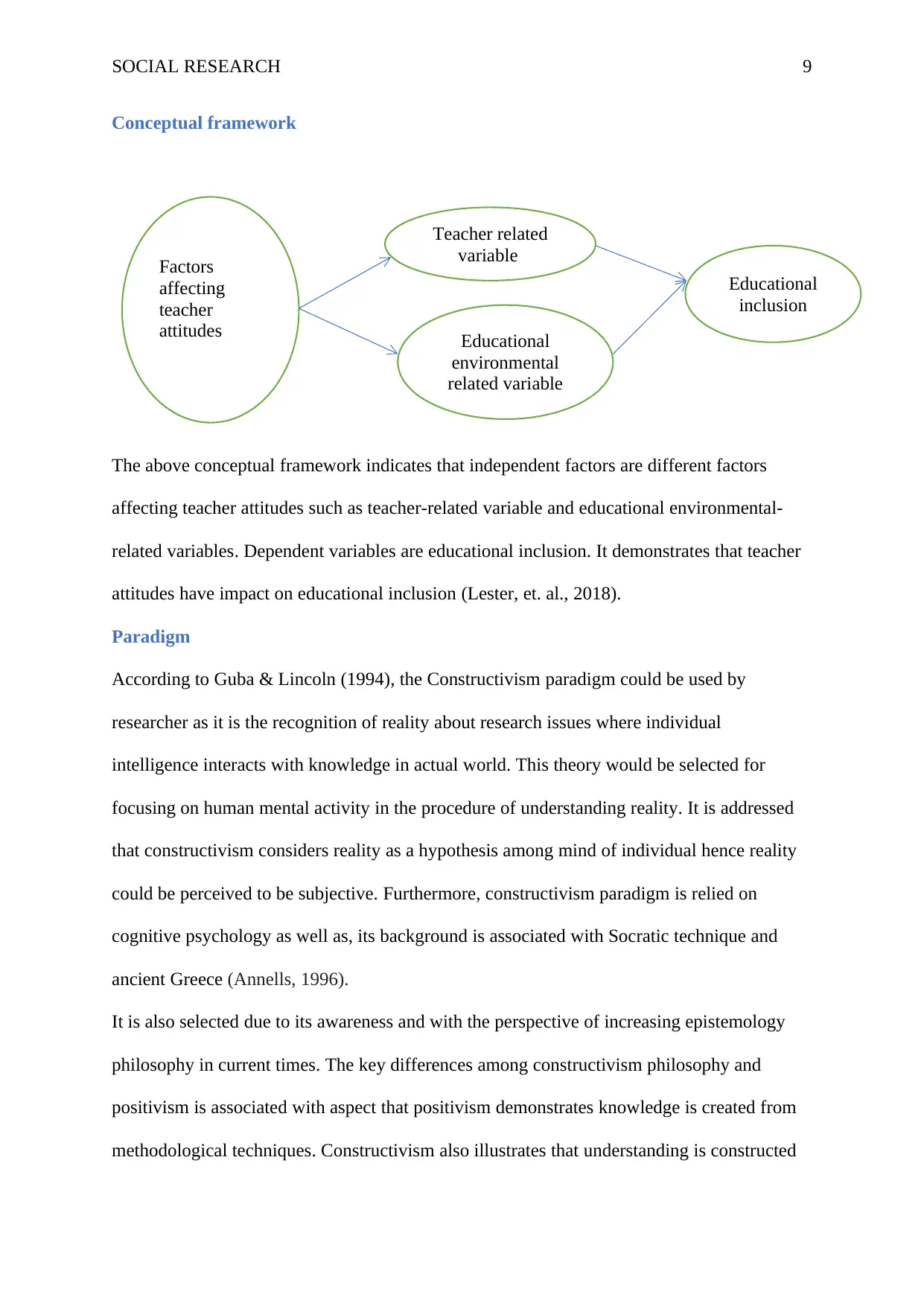
SOCIAL RESEARCH 9
Conceptual framework
The above conceptual framework indicates that independent factors are different factors
affecting teacher attitudes such as teacher-related variable and educational environmental-
related variables. Dependent variables are educational inclusion. It demonstrates that teacher
attitudes have impact on educational inclusion (Lester, et. al., 2018).
Paradigm
According to Guba & Lincoln (1994), the Constructivism paradigm could be used by
researcher as it is the recognition of reality about research issues where individual
intelligence interacts with knowledge in actual world. This theory would be selected for
focusing on human mental activity in the procedure of understanding reality. It is addressed
that constructivism considers reality as a hypothesis among mind of individual hence reality
could be perceived to be subjective. Furthermore, constructivism paradigm is relied on
cognitive psychology as well as, its background is associated with Socratic technique and
ancient Greece (Annells, 1996).
It is also selected due to its awareness and with the perspective of increasing epistemology
philosophy in current times. The key differences among constructivism philosophy and
positivism is associated with aspect that positivism demonstrates knowledge is created from
methodological techniques. Constructivism also illustrates that understanding is constructed
Factors
affecting
teacher
attitudes
Teacher related
variable
Educational
environmental
related variable
Educational
inclusion
Conceptual framework
The above conceptual framework indicates that independent factors are different factors
affecting teacher attitudes such as teacher-related variable and educational environmental-
related variables. Dependent variables are educational inclusion. It demonstrates that teacher
attitudes have impact on educational inclusion (Lester, et. al., 2018).
Paradigm
According to Guba & Lincoln (1994), the Constructivism paradigm could be used by
researcher as it is the recognition of reality about research issues where individual
intelligence interacts with knowledge in actual world. This theory would be selected for
focusing on human mental activity in the procedure of understanding reality. It is addressed
that constructivism considers reality as a hypothesis among mind of individual hence reality
could be perceived to be subjective. Furthermore, constructivism paradigm is relied on
cognitive psychology as well as, its background is associated with Socratic technique and
ancient Greece (Annells, 1996).
It is also selected due to its awareness and with the perspective of increasing epistemology
philosophy in current times. The key differences among constructivism philosophy and
positivism is associated with aspect that positivism demonstrates knowledge is created from
methodological techniques. Constructivism also illustrates that understanding is constructed
Factors
affecting
teacher
attitudes
Teacher related
variable
Educational
environmental
related variable
Educational
inclusion
⊘ This is a preview!⊘
Do you want full access?
Subscribe today to unlock all pages.

Trusted by 1+ million students worldwide
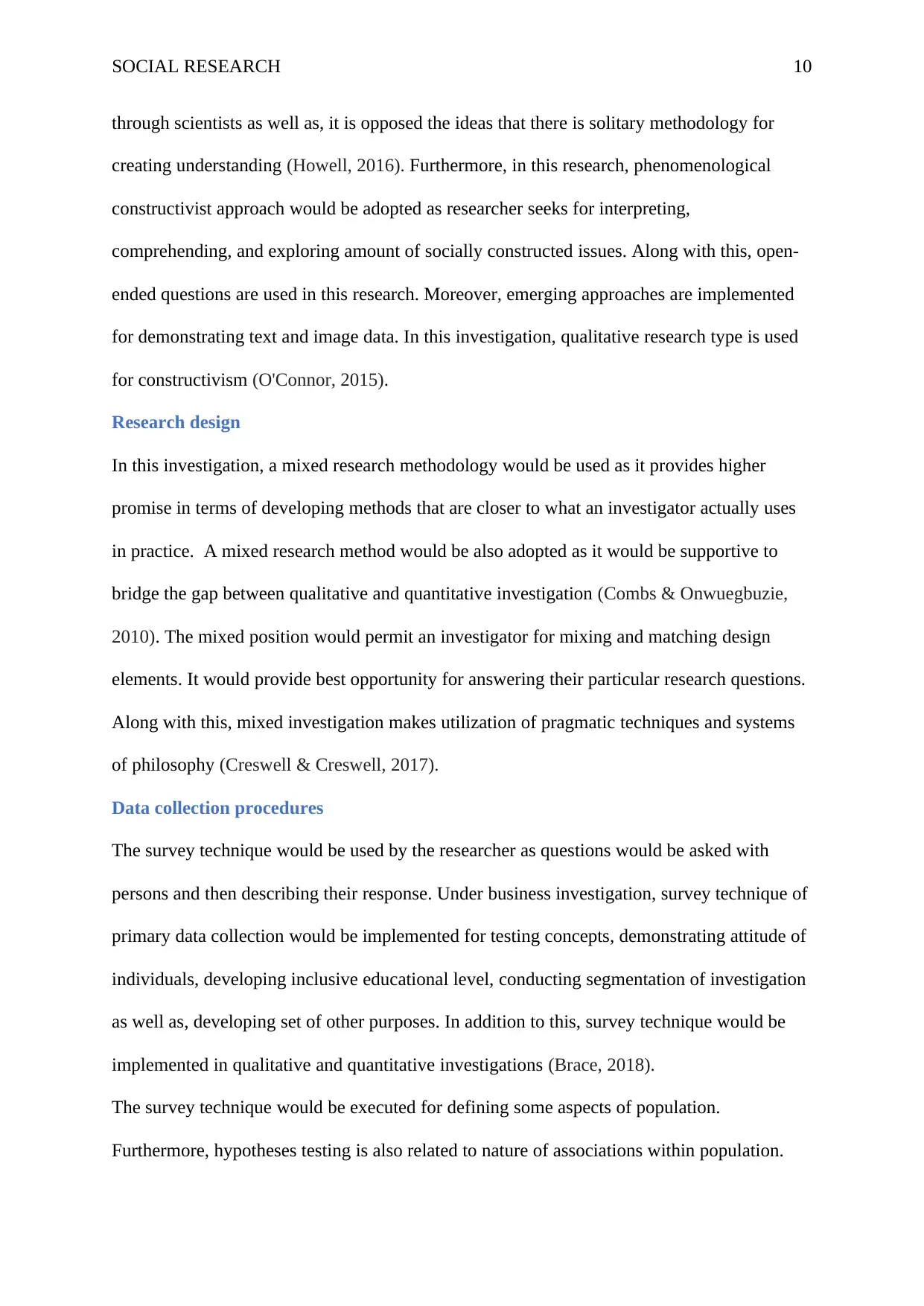
SOCIAL RESEARCH 10
through scientists as well as, it is opposed the ideas that there is solitary methodology for
creating understanding (Howell, 2016). Furthermore, in this research, phenomenological
constructivist approach would be adopted as researcher seeks for interpreting,
comprehending, and exploring amount of socially constructed issues. Along with this, open-
ended questions are used in this research. Moreover, emerging approaches are implemented
for demonstrating text and image data. In this investigation, qualitative research type is used
for constructivism (O'Connor, 2015).
Research design
In this investigation, a mixed research methodology would be used as it provides higher
promise in terms of developing methods that are closer to what an investigator actually uses
in practice. A mixed research method would be also adopted as it would be supportive to
bridge the gap between qualitative and quantitative investigation (Combs & Onwuegbuzie,
2010). The mixed position would permit an investigator for mixing and matching design
elements. It would provide best opportunity for answering their particular research questions.
Along with this, mixed investigation makes utilization of pragmatic techniques and systems
of philosophy (Creswell & Creswell, 2017).
Data collection procedures
The survey technique would be used by the researcher as questions would be asked with
persons and then describing their response. Under business investigation, survey technique of
primary data collection would be implemented for testing concepts, demonstrating attitude of
individuals, developing inclusive educational level, conducting segmentation of investigation
as well as, developing set of other purposes. In addition to this, survey technique would be
implemented in qualitative and quantitative investigations (Brace, 2018).
The survey technique would be executed for defining some aspects of population.
Furthermore, hypotheses testing is also related to nature of associations within population.
through scientists as well as, it is opposed the ideas that there is solitary methodology for
creating understanding (Howell, 2016). Furthermore, in this research, phenomenological
constructivist approach would be adopted as researcher seeks for interpreting,
comprehending, and exploring amount of socially constructed issues. Along with this, open-
ended questions are used in this research. Moreover, emerging approaches are implemented
for demonstrating text and image data. In this investigation, qualitative research type is used
for constructivism (O'Connor, 2015).
Research design
In this investigation, a mixed research methodology would be used as it provides higher
promise in terms of developing methods that are closer to what an investigator actually uses
in practice. A mixed research method would be also adopted as it would be supportive to
bridge the gap between qualitative and quantitative investigation (Combs & Onwuegbuzie,
2010). The mixed position would permit an investigator for mixing and matching design
elements. It would provide best opportunity for answering their particular research questions.
Along with this, mixed investigation makes utilization of pragmatic techniques and systems
of philosophy (Creswell & Creswell, 2017).
Data collection procedures
The survey technique would be used by the researcher as questions would be asked with
persons and then describing their response. Under business investigation, survey technique of
primary data collection would be implemented for testing concepts, demonstrating attitude of
individuals, developing inclusive educational level, conducting segmentation of investigation
as well as, developing set of other purposes. In addition to this, survey technique would be
implemented in qualitative and quantitative investigations (Brace, 2018).
The survey technique would be executed for defining some aspects of population.
Furthermore, hypotheses testing is also related to nature of associations within population.
Paraphrase This Document
Need a fresh take? Get an instant paraphrase of this document with our AI Paraphraser
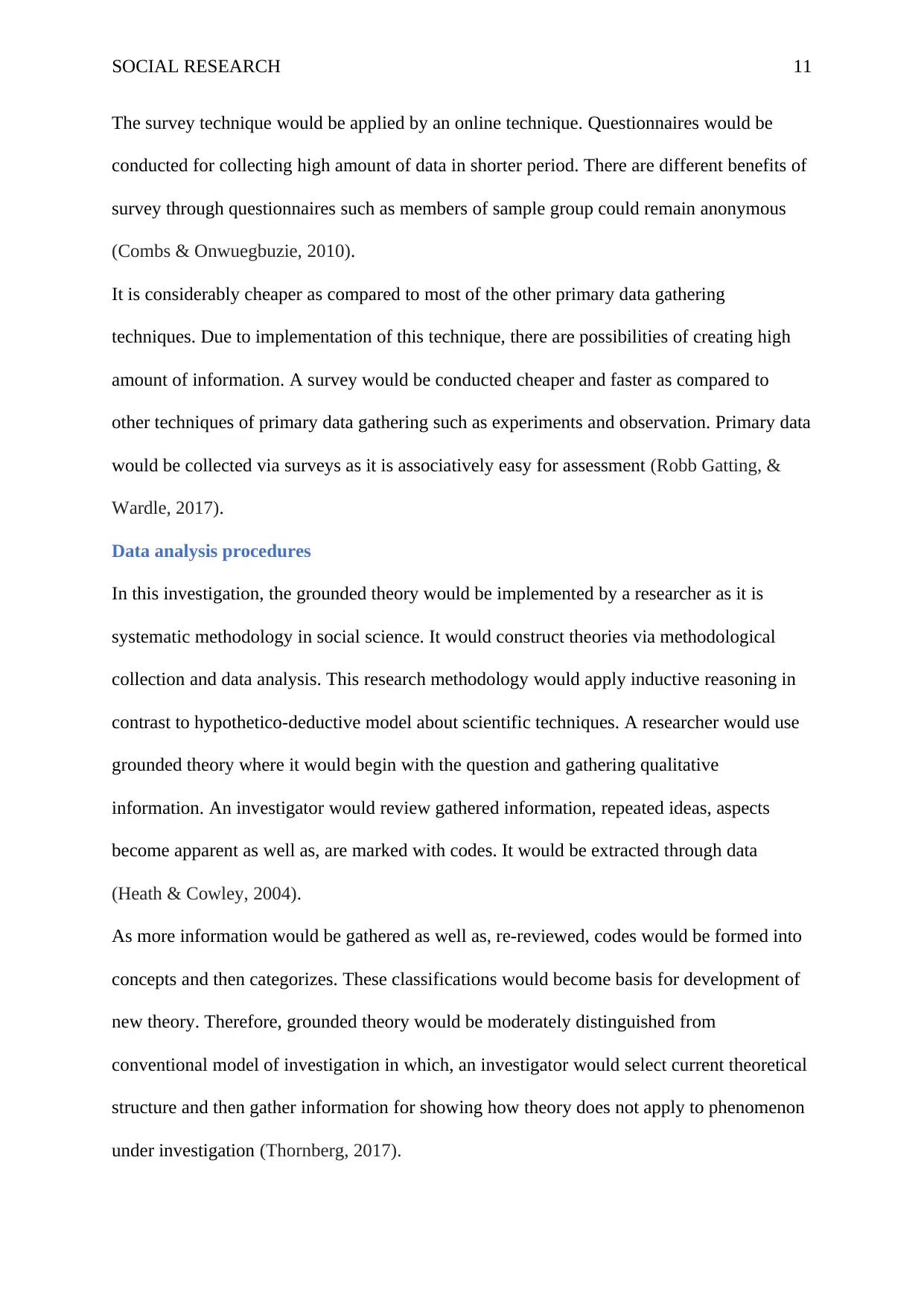
SOCIAL RESEARCH 11
The survey technique would be applied by an online technique. Questionnaires would be
conducted for collecting high amount of data in shorter period. There are different benefits of
survey through questionnaires such as members of sample group could remain anonymous
(Combs & Onwuegbuzie, 2010).
It is considerably cheaper as compared to most of the other primary data gathering
techniques. Due to implementation of this technique, there are possibilities of creating high
amount of information. A survey would be conducted cheaper and faster as compared to
other techniques of primary data gathering such as experiments and observation. Primary data
would be collected via surveys as it is associatively easy for assessment (Robb Gatting, &
Wardle, 2017).
Data analysis procedures
In this investigation, the grounded theory would be implemented by a researcher as it is
systematic methodology in social science. It would construct theories via methodological
collection and data analysis. This research methodology would apply inductive reasoning in
contrast to hypothetico-deductive model about scientific techniques. A researcher would use
grounded theory where it would begin with the question and gathering qualitative
information. An investigator would review gathered information, repeated ideas, aspects
become apparent as well as, are marked with codes. It would be extracted through data
(Heath & Cowley, 2004).
As more information would be gathered as well as, re-reviewed, codes would be formed into
concepts and then categorizes. These classifications would become basis for development of
new theory. Therefore, grounded theory would be moderately distinguished from
conventional model of investigation in which, an investigator would select current theoretical
structure and then gather information for showing how theory does not apply to phenomenon
under investigation (Thornberg, 2017).
The survey technique would be applied by an online technique. Questionnaires would be
conducted for collecting high amount of data in shorter period. There are different benefits of
survey through questionnaires such as members of sample group could remain anonymous
(Combs & Onwuegbuzie, 2010).
It is considerably cheaper as compared to most of the other primary data gathering
techniques. Due to implementation of this technique, there are possibilities of creating high
amount of information. A survey would be conducted cheaper and faster as compared to
other techniques of primary data gathering such as experiments and observation. Primary data
would be collected via surveys as it is associatively easy for assessment (Robb Gatting, &
Wardle, 2017).
Data analysis procedures
In this investigation, the grounded theory would be implemented by a researcher as it is
systematic methodology in social science. It would construct theories via methodological
collection and data analysis. This research methodology would apply inductive reasoning in
contrast to hypothetico-deductive model about scientific techniques. A researcher would use
grounded theory where it would begin with the question and gathering qualitative
information. An investigator would review gathered information, repeated ideas, aspects
become apparent as well as, are marked with codes. It would be extracted through data
(Heath & Cowley, 2004).
As more information would be gathered as well as, re-reviewed, codes would be formed into
concepts and then categorizes. These classifications would become basis for development of
new theory. Therefore, grounded theory would be moderately distinguished from
conventional model of investigation in which, an investigator would select current theoretical
structure and then gather information for showing how theory does not apply to phenomenon
under investigation (Thornberg, 2017).
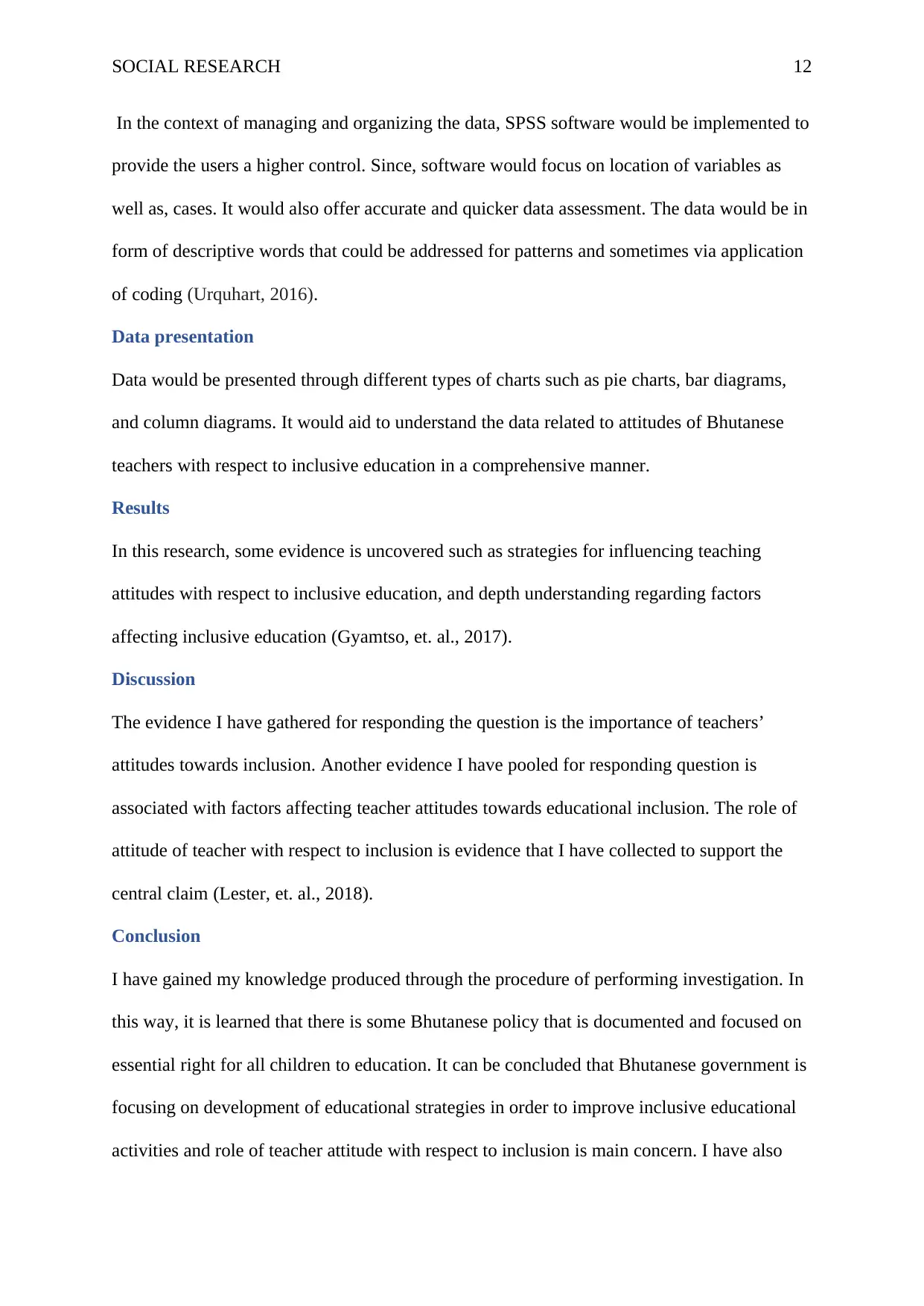
SOCIAL RESEARCH 12
In the context of managing and organizing the data, SPSS software would be implemented to
provide the users a higher control. Since, software would focus on location of variables as
well as, cases. It would also offer accurate and quicker data assessment. The data would be in
form of descriptive words that could be addressed for patterns and sometimes via application
of coding (Urquhart, 2016).
Data presentation
Data would be presented through different types of charts such as pie charts, bar diagrams,
and column diagrams. It would aid to understand the data related to attitudes of Bhutanese
teachers with respect to inclusive education in a comprehensive manner.
Results
In this research, some evidence is uncovered such as strategies for influencing teaching
attitudes with respect to inclusive education, and depth understanding regarding factors
affecting inclusive education (Gyamtso, et. al., 2017).
Discussion
The evidence I have gathered for responding the question is the importance of teachers’
attitudes towards inclusion. Another evidence I have pooled for responding question is
associated with factors affecting teacher attitudes towards educational inclusion. The role of
attitude of teacher with respect to inclusion is evidence that I have collected to support the
central claim (Lester, et. al., 2018).
Conclusion
I have gained my knowledge produced through the procedure of performing investigation. In
this way, it is learned that there is some Bhutanese policy that is documented and focused on
essential right for all children to education. It can be concluded that Bhutanese government is
focusing on development of educational strategies in order to improve inclusive educational
activities and role of teacher attitude with respect to inclusion is main concern. I have also
In the context of managing and organizing the data, SPSS software would be implemented to
provide the users a higher control. Since, software would focus on location of variables as
well as, cases. It would also offer accurate and quicker data assessment. The data would be in
form of descriptive words that could be addressed for patterns and sometimes via application
of coding (Urquhart, 2016).
Data presentation
Data would be presented through different types of charts such as pie charts, bar diagrams,
and column diagrams. It would aid to understand the data related to attitudes of Bhutanese
teachers with respect to inclusive education in a comprehensive manner.
Results
In this research, some evidence is uncovered such as strategies for influencing teaching
attitudes with respect to inclusive education, and depth understanding regarding factors
affecting inclusive education (Gyamtso, et. al., 2017).
Discussion
The evidence I have gathered for responding the question is the importance of teachers’
attitudes towards inclusion. Another evidence I have pooled for responding question is
associated with factors affecting teacher attitudes towards educational inclusion. The role of
attitude of teacher with respect to inclusion is evidence that I have collected to support the
central claim (Lester, et. al., 2018).
Conclusion
I have gained my knowledge produced through the procedure of performing investigation. In
this way, it is learned that there is some Bhutanese policy that is documented and focused on
essential right for all children to education. It can be concluded that Bhutanese government is
focusing on development of educational strategies in order to improve inclusive educational
activities and role of teacher attitude with respect to inclusion is main concern. I have also
⊘ This is a preview!⊘
Do you want full access?
Subscribe today to unlock all pages.

Trusted by 1+ million students worldwide
1 out of 17
Related Documents
Your All-in-One AI-Powered Toolkit for Academic Success.
+13062052269
info@desklib.com
Available 24*7 on WhatsApp / Email
![[object Object]](/_next/static/media/star-bottom.7253800d.svg)
Unlock your academic potential
Copyright © 2020–2026 A2Z Services. All Rights Reserved. Developed and managed by ZUCOL.





